Classical Conferences and Meetings in 2019–2020
|
2019
ACTFL—American Council on the Teaching of Foreign Language
2019 Annual Convention and World Languages Expo
November 22–24, 2019
Walter E. Washington Convention Center
Washington, DC
Representative: Donald Sprague
2020
SCS/AIA—Society for Classical Studies/Archaeological Institute of America
2020 Annual Meeting
January 2–5, 2020
Marriott Marquis
Washington, DC
Representatives: Bridget Dean and Donald Sprague
CANE—Classical Association of New England
March 13–14, 2020
Trinity College
Hartford, CT
Representative: Donald Sprague
CAMWS—Classical Association of the Middle West and South
116th Annual Meeting of the Classical Association of the Middle West and South
March 25–28, 2020
Hyatt Regency Birmingham--The Wynfrey Hotel
Birmingham, Alabama
at the invitation of Samford University
Representatives: Donald Sprague and Amelia Wallace
The 53rd International Congress on Medieval Studies
May 7–10, 2020
Western Michigan University
Kalamazoo, MI
Representatives: Adam Velez and Laurel Draper
ACL—The American Classical League
72nd Annual Institute
June 25–27, 2020
College of Charleston
Charleston, SC
Representatives: Laurel Draper and Donald Sprague
NJCL—National Junior Classical League
Annual Convention
July 24–29, 2020
University of Richmond
Richmond, VA
Representatives: Donald Sprague and Amelia Wallace
|
|
Reflections on Using LUMINA: Latin for the New Millennium
November 19, 2019: 5:00–6:00 Central Time (6:00–7:00 Eastern Time)
Presenter: Michael de Brauw, North Central College
Professor de Brauw uses Latin for the New Millennium in his Latin 101-1 course at North Central College in Naperville, IL. Excited by Bolchazy-Carducci editor Amelia Wallace's CAMWS presentation on LUMINA, an online guided practice learning tool for LNM, he has incorporated its use into the elementary Latin class. In his webinar, Professor de Brauw will share his insights into using this online interactive learning tool with his students.
Michael de Brauw is Associate Professor of Classics at North Central College. He is Program Coordinator for Classical Studies and a member of both the Department of Modern and Classical Languages and the Program in Gender and Sexuality. He teaches Latin and Greek, as well as courses on ancient Greek and Roman history and culture, including classical mythology. His research interests focus on Greek and Roman rhetoric, law, and cultural history. Professor de Brauw has also taught at Johns Hopkins University and the University of Minnesota. He earned his BA from the University of Chicago and his PhD at the University of Texas at Austin.
Implementing Aural/Oral Activities in the LNM Classroom
December 10, 2019: 5:00–6:00 Central Time (6:00–7:00 Eastern Time)
Presenter: Terence Tunberg, University of Kentucky
Let an accomplished educator and living Latin enthusiast gently walk you through the aural/oral opportunities presented by Latin for the New Millennium, Levels 1 and 2. Coauthor, Dr. Terence Tunberg, will set you at ease as he provides various suggestions and strategies for implementing or enhancing the spoken Latin component of your classes. He will share with you the bounty of aural/oral activities and exercises in the LNM Teacher Manuals and demonstrate how teacher-friendly they are!
Terence Tunberg, coauthor of Latin for the New Millennium, Levels 1 and 2, is a world-renowned Neo-Latinist and scholar of Latin literature through the ages. He is especially esteemed for his enthusiastic promotion of active Latin. The celebrated Conventiculum Latinum Lexintoniense—the Conversational Latin Seminar held each summer at the University of Kentucky and the longest-running immersion program in America—has spawned a network of similar programs across the country. Tunberg earned his BA and MA in classics at the University of Southern California, did postgraduate research and doctoral work in medieval studies at the University of London, England, and earned a PhD in classical philology from the University of Toronto, Canada.
|
|
Bolchazy-Carducci Publishers is pleased to provide complimentary webinars on a variety of subjects, especially pedagogical, of interest to classicists. Some webinars are geared to the Latin for the New Millennium program and to topics generated by the AP* Latin curriculum.
Read eLitterae or follow us on Facebook and Twitter for the announcement of our fall series of free webinars.
Please note: The Bolchazy-Carducci Publishers Webinar Program is intended to be a live interactive endeavor in which presenter and attendees ask questions, make comments, seek clarification, share examples, etc. Thus, by design and in order to protect the presenter’s intellectual property, B-C does not make recordings available to non-attendees. B-C encourages those interested in a given topic or presenter to plan to attend the live webinar.
If you have suggestions for webinars, please contact Don Sprague.
What Equipment Do I Need for B-C Webinars?
To participate in Bolchazy-Carducci Publishers sponsored webinars you will need high-speed internet access, computer speakers/headphones, current web browser, and the link to the webinar virtual meeting space, which is provided in your webinar invitation.
Webinars Make for User-Friendly Professional Development
Participation is free. All webinars provide opportunity for participants to ask questions. Learn lots—attend as many presentations as you can. Bolchazy-Carducci Publishers provides documentation for your participation. You can share this with your supervisors. Many webinar presenters provide handouts, etc.
|
|
Bolchazy-Carducci Publishers provides eTextbooks on a variety of eBook platforms. Bolchazy-Carducci textbooks are available through VitalSource, GooglePlay, Chegg, RedShelf, Adams Book, Follett, MBSDirect Digital, and ESCO. Each eBook platform offers a variety of tools to enhance the learning process. eBooks have the same content as our traditional books in print.
You can read eBooks on a Mac, PC, iPhone, iPad, Android, or a variety of eReaders. Review the eBook providers specifications.
|
|
Registration is OPEN! Reserve your space for this special program NOW!
To celebrate the American Classical League Centennial, ACL is pleased to sponsor
ROMA2020—Rome through the Ages, a customized study tour of Rome and neighboring sites and an optional "after party" tour to Campania.
ACL Technology Chair Cindy Caltagirone joins forces with B-C editor Don Sprague as leaders for the tour. Together they bring decades of experience leading study tours and especially tours of Rome.
The Rome portion is scheduled to begin July 6 and run through July 16. Those choosing the optional tour (July 16–21) to Campania will spend four nights in Sorrento and a final night in Rome.
So, plan to join us for ROMA2020-ACL100.
|
|
The 2019-2020 Roman Calendar has been mailed. It is also available as a download. If you would like to be included in the 2020-2021 Roman Calendar mailing please submit your request.
The 2019–2020 Roman Calendar features twelve mythical monsters from the 2019 edition of Martia Dementia, Bolchazy-Carducci’s annual spring bracket tournament. Be sure to follow the B-C blog for monthly teaching suggestions about the featured monster.
|
|
Preview Bolchazy-Carducci Titles
Preview Bolchazy-Carducci titles before you purchase using Google Preview.
Downloadable Products
iPodius - Bolchazy-Carducci Publishers online shop for: audio, software, video, and a treasure trove of teacher-created materials in the Agora.
BCP Facebook Fan Page
Become a FAN of Bolchazy-Carducci Publishers, visit our Facebook Fan page for the latest news from BCP.
BCP Blog
Visit the BCPublishers Blog for B-C news and information.
BCPublishers on Twitter
Follow us on Twitter
AP® is a trademark registered and/or owned by the College Board, which was not involved in the production of, and does not endorse, this site.
These products have been developed independently from and are not endorsed by the International Baccalaureate (IB).
|
|
|
|
Dear Colleagues,
We are happy to announce this year’s Cyber Monday 40% off discount. For details, see the announcement in this issue. Mark the dates on your calendars!
We are pleased with all the positive reports we are receiving about Lumina: Online Guided Practice to Accompany LNM. To learn more, see the webinars posting later in this issue and hear Professor Michael de Brauw of North Central College share his insights on using Lumina. Mark your calendar for November 19!
Composing this issue’s report on the Jesuit Latin Colloquium V prompted some personal reflection on the connectedness of our discipline. Do indulge me for a moment . . .
The gathering in Cincinnati elicited a wave of connections. These colloquia always bring forth fond memories of my twenty-six years teaching Latin and Greek at Loyola Academy, the Jesuit college preparatory school just north of Chicago. The presence of two teachers, Emil Penarubia and Maureen Toner, from Boston College High triggered memories of my first studies of Latin and Greek. Emil was a classics major at the College of the Holy Cross along with my former student from Loyola Academy, Tim Joseph, who now teaches in their classics department. I know Maureen’s mother, a Latin teacher retired from the Chicago Public Schools, from our participation in the Illinois Classical Conference. Rev. Bryan Norton, S.J., who delivered the Rettig Lecture, prompted recollections of my undergraduate studies when he referenced our mutual alma mater, Williams College. Xavier University and its Classics and Philosophy Honors AB Program recently came up in conversation while I was at the annual meeting of the Classical Association of the Atlantic States. While dining with the parents of former students Paul and Tim Joseph (mentioned above), Bob and Sarah Joseph, Bob mentioned having attended his college reunion at Xavier and his checking in at the CPHAB office. To bring things full circle, Bob also shared that he serves as a docent for the Anderson House in Washington, DC, the home of the Society of the Cincinnati. In his presentation at the Jesuit Latin Colloquium, Professor Thomas Strunk noted that the city of Cincinnati was renamed for Society of the Cincinnati, whose members are descended from those who fought in the American War for Independence. Connections. Connections. Connections.
As we celebrate Thanksgiving later this month, know that we at Bolchazy-Carducci Publishers appreciate our connections with you, our classics colleagues. Thank you for those connections.
All best,
Don Sprague
Editor
don@bolchazy.com
|
|
Jesuit Latin Colloquium V Report
|
The Latin teachers of St. Xavier High School in Cincinnati, OH—Nora Denning, Dan Dery, and Braden Mechley—organized and hosted the Jesuit Latin Colloquium V, November 7–9. The gathering of high school Latin teachers represented twenty Jesuit high schools from Bellarmine Prep in San Jose, CA, and Gonzaga Preparatory in Spokane, WA, to Boston College High in Boston, MA, Xavier High in New York City, and Jesuit High in New Orleans, LA. The biennial conference set a record with thirty-nine attendees. Bolchazy-Carducci Publishers was honored to have been invited to exhibit. Editor Don Sprague, who taught for twenty-six years at the Jesuit Loyola Academy in Wilmette, IL, again represented the company.
The conference carefully blended informal networking time with formal presentations and small group discussions on topics suggested by participants. In this vein, conferees gathered Thursday evening at Cincinnati’s Fueled Collective for pre-prandial and hearty hors d’oeuvres and pizza from Bravo Cocina. The informal setting encouraged returning attendees to catch up with one another while welcoming teachers new to the colloquium. Almost half of the attendees were newcomers.
Professor Thomas Strunk of Cincinnati’s Xavier University, where he teaches in the classics department and leads the CPHAB honors program in classics and philosophy, kicked off the colloquium’s presentations with a talk entitled “A Tale of Two Dictators: Caesar and Cincinnatus” that made connections between the classical world and Cincinnati, OH.
The familiar trio of the she-wolf, Romulus, and Remus is found in Cincinnati’s Eden Park, which follows along the bluffs above the Ohio River. Professor Strunk’s talk provided
the context for this statue, a gift from the fascist Mussolini of Italy. Note the Italian inscription. The date beneath is hard to read—1931, Anno X.
Other presentations included “Romance Languages via Latin,” “Savvy Travel: Tips for Touring Italia,” “Lingua Latina per Sē Illūstrāta: Experimenting with the Natural Method,” and “Social Justice: Cicero, World War II, and Today.” A highlight of each colloquium is taking a tour, led by Latin students, of the host high school campus and facilities. This took place Friday morning after the welcome and before the formal program of presentations. Friday’s program ended at Xavier University with the annual Rettig Lecture and Reception sponsored by the CPHAB program. Fr. Bryan Norton, S.J., took a break from his studies in Paris, France, to provide a brilliant lecture, “The Jesuit Classical Tradition: Past Perspectives, Contemporary Questions, Future Horizons,” to a full house.
The colloquium ended Saturday morning with Fr. Norton celebrating a Latin Mass at Xavier University’s Bellarmine Chapel. Following the service, St. X classicist Dan Dery led a group to Eden Park and the Cincinnati Art Museum. Attendees returned to their schools energized, enthused about their teaching, and planning to attend Jesuit Latin Colloquium VI in 2021 at an East Coast Jesuit high school.
|
|
Guest Reflection on Latin Pedagogy:
An AP Latin Program, Part 2
|
The Advanced Placement syllabus, the ACTFL standards and their ACL adaptation, and state and local curricula often stipulate that interpretive communication allows learners to understand, interpret, and analyze what is heard, read, or viewed on a variety of topics. For this reason it is important that the cross-pollination between AP Latin goals and all levels of Latin be integral to the program.
Early on in instruction for beginning texts that do not feature Latin-author based readings, it is beneficial to introduce outside readings from The Latin Library. When celebrating Caesar in March of Latin 2, you can present students a modified version of an excerpt from De Bello Gallico. For example, the Druids regularly fascinate students. An excerpt (DBG 6.14) from the AP Latin syllabus follows.
Druides a bello abesse consuerunt neque tributa una cum reliquis pendunt; militiae vacationem omniumque rerum habent immunitatem. Tantis excitati praemiis et sua sponte multi disciplinam conveniunt et a parentibus propinquisque mittuntur.
Magnum ibi numerum versuum ediscere dicuntur. Itaque annos nonnulli vicenos in disciplina permanent. Neque fas esse existimant ea litteris mandare, cum in reliquis fere rebus, publicis privatisque rationibus, Graecis litteris utantur.
If you want to expose Latin 2 or early Latin 3 students to AP Latin texts, you can adapt this passage in a straightforward way by simply changing the word order to the English word order and giving vocabulary help as necessary (e.g., pendunt, tributa, ediscere, mandare, utantur) This activity exposes students to previously unseen text and, with vocabulary provided, they are better able to comprehend Caesar’s own Latin.
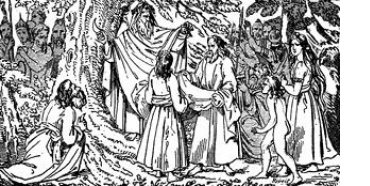 Druides consuerunt abesse a bello neque pendunt tributa una cum reliquis; habent vacationem militiae immunitatem omniumque rerum. Excitati tantis praemiis et sua sponte multi conveniunt in disciplinam et mittuntur a parentibus propinquisque. Dicuntur ediscere magnum ibi numerum versuum. Itaque permanent in disciplina nonnulli XX annos. Neque existimant fas esse mandare ea litteris, cum in fere reliquis rebus, utantur publicis privatisque rationibus Graecis litteris. Druides consuerunt abesse a bello neque pendunt tributa una cum reliquis; habent vacationem militiae immunitatem omniumque rerum. Excitati tantis praemiis et sua sponte multi conveniunt in disciplinam et mittuntur a parentibus propinquisque. Dicuntur ediscere magnum ibi numerum versuum. Itaque permanent in disciplina nonnulli XX annos. Neque existimant fas esse mandare ea litteris, cum in fere reliquis rebus, utantur publicis privatisque rationibus Graecis litteris.
Regardless of your state or school district performance indicators, check points, or other criteria for student performance, you probably have your own guidelines for reading and comprehension, translation, and some kind of textual analysis. How do you make critical thinking a basic part of your instruction? How do you check for understanding of vocabulary, translation, analysis? For this passage, overall thought questions that check for such understanding might be:
- Were the Druids warlike?
- What was their learning process?
- Why did they use Greek letters?
For a more specific check for understanding of the adapted passage’s four sentences, ask students to articulate what happens in each sentence and include specific Latin words that indicate where they found their answers. This activity is the basis of writing an essay with Latin support. And reading your adaptations of the text of either the Aeneid or De Bello Gallico is a learning activity that exposes students to the thoughts and ideas that we hope will stimulate them to look forward to their later, more intensive work with the original texts.
Reading Latin from the earliest days in the first year is about communication and learning about another culture. What are we trying to learn about these people? I hope we can inspire students both to develop an interest in and to grow in their knowledge of an ancient culture. In Latin, our communication goal means translation, interpretation, contextualization, and reading aloud with appropriate attention to the metrical form, in effect, sharing the sounds the ancients heard when a poet read his work aloud. It is my belief that the basic tenets of the AP Latin program can readily permeate and enhance your instruction and can lead students toward higher level thinking and understanding of Latin texts, and prepare them well for the fifth semester of college Latin, i.e., the AP Latin course.
Jill Crooker
Editor’s Note: Latin for the New Millennium, Level 1, features two passages about Aeneas and Dido adapted from Vergil’s Aeneid and one about the Druids from Caesar’s De Bello Gallico. As a text for Latin 3, consider Caesar: A LEGAMUS Transitional Reader—it is an excellent component for a Pre-AP* Vertical Teams curriculum. The LEGAMUS Series was designed to provide a student-friendly transition from beginning Latin texts to unadapted texts from Latin literature.
About the Author: Jill Crooker is a former chair of the SAT II Latin Test Development Committee and for more than 25 years taught Latin I through AP Latin in both the Pittsford, New York public schools and the Allendale Columbia School. She has also taught summer courses for teachers at the Taft School in Watertown, Connecticut, which focus on the development of Latin III curriculum with a reading/translation approach modeled after the AP Latin examination and stressing the National Standards for Classical Languages. She has served as an AP Latin reader and has written numerous articles for professional publications specifically about the SAT II, preparation of students for Section I of the AP Latin Examinations, and assessment practices in the foreign language classroom. Crooker also worked as a consultant for the New York State Education Department, where she mentored teachers, facilitated the Statewide Peer Review for Languages Other than English, and chaired the development of the Resource Guide: Latin for the 21st Century.
|
|
Teaching Tips & Resources
|
► The Latin of Science
B-C is pleased to announce that we have added digital content to the webpage for The Latin of Science. This content includes:
• Facsimiles to read online or project for use in your class. Use this link to open the list of available images. Click on the image thumbnail to view full size.
Teachers may refer students to these exercises on an as needed basis for review of grammatical concepts.
• Exercises to Accompany The Latin of Science. Use this link to download the file containing exercises coordinated with the material presented in the chapters of the Compendium of Latin Grammar presented in Appendix II of The Latin of Science, page 249.
• Answers for the Exercises. Use this link to download the file containing the answers for the exercises.
► Science Serves Archaeology
• Laser scans uncover sites.
• Dogs assist in graves detection.
• Roman slaves help unlock mysteries of the universe.
• New technique uncovers Herculaneum artworks.
• Mysterious scrolls and Julius Caesar.
• Pliny the Elder’s writing on viticulture still relevant.
► The Value of the Classics
• Classics major is baseball executive.
• Greek mythology inspires Ravens general manager.
• A tribute to Reginald Foster.
► Res Romanae
• The Torlonia “collection of collections.”
• Will tourists ruin Pompeii?
• Magnificent villa reopens in Herculaneum.
• Street from Pontius Pilate’s time.
► Res Hellenicae
• The chorus from Antigone.
• Greeks in China before Marco Polo?
► Developments in Egypt
• Trove of coffins found in Luxor.
|
|
The corridor connecting Terminal 1 and 2 at O’Hare International Airport in Chicago is decorated with a series of artwork created by youth participating in the city’s Gallery 37 art program. The caryatid, most likely inspired by Chicago’s Museum of Science and Industry’s “Porch of the Maidens,” catches a classicist’s eye. The Columbian Exposition of 1893 Fine Arts Building now houses the Museum of Science and Industry.
Editor Amelia Wallace carves classical pumpkin!
|
|
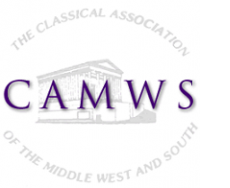 |
CAMWS College Greek Exam
deadline: October 31, 2019 Fall administration
deadline: January 31, 2020
administration: March 11–15, 2020
|
 |
CAMWS Latin Translation Contest
[intermediate and advanced levels for
high school students and for college students]
deadline: November 1, 2019
administration: November 18–December 6, 2019
|
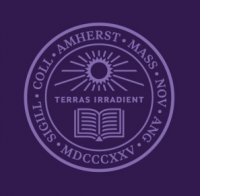 |
Amherst College
Harry de Forest Smith Greek Translation Contest
Contact Department of Classics
registration: late November 2019
administration: February 7, 2020
(Friday of 2nd week of February)
|
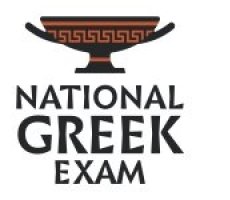 |
National Greek Exam
deadline: January 17, 2020
administration: February 24–March 6, 2020
|
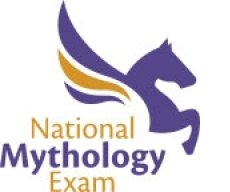 |
About the National Mythology Exam
deadline: January 15, 2020
administration: February 17–March 1, 2020
|
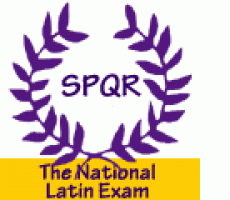 |
National Latin Exam
deadline: January 21, 2020
administration: February 24–March 13, 2020
|
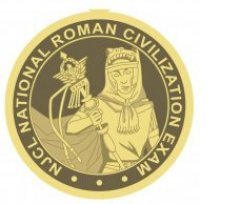 |
National Roman Civilization Exam
deadline: January 31, 2020
administration: February 10–March 13, 2020
|
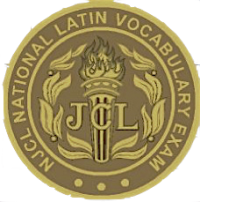 |
National Latin Vocabulary
deadline: January 31, 2020
administration: February 10–March 13, 2020
|
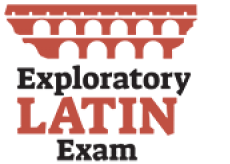 |
The Exploratory Latin Exam - ELE
deadline: March 2, 2020
administration: January 1–April 1, 2020
|
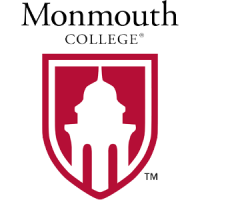 |
Bernice L. Fox Classics Writing Contest
“Hindsight in 2020”
deadline: March 15, 2020 postmark
|
|
|
Lumina: Released to Great Acclaim!
|
Lumina: Online Guided Practice to Accompany LNM
Lumina online content offers new resources to support LNM, Levels 1 and 2. The interactive guided Language Fact sections provide immediate feedback to students as they preview or review each chapter of Latin for the New Millennium Level 1 or Level 2. Mouse-over vocabulary lists allow a new format for vocabulary mastery. Infinitely replayable crossword puzzles engage students in derivative work. Automatically graded quizzes free up student-teacher interaction time for translation, oral/aural work, discussion, and other learning activities. For a brief overview of the program, check out this video.
Learn more about Lumina, attend the webinar on November 19. Professor Michael de Brauw will share his experience working with Latin students at North Central College.
Visit our website product pages for information.
Lumina: Latin for the New Millennium Level 1
• Classroom Option
• Individual User Option
Lumina: Latin for the New Millennium Level 2
• Classroom Option
• Individual User Option
Artes Latinae: A Self-Teaching,
Self-Paced Interactive Latin Program
Lumina offers a revamped Artes Latinae. This fully interactive online program teaches all of Latin grammar in two courses. Purchase the program at a special discounted price of 25% off! For a brief overview of the program, check out this video.
Visit our website product pages for information.
• Lumina: Artes Latinae Level 1
• Lumina: Artes Latinae Level 2
Based on the program developed by Dr. Waldo E. Sweet of the University of Michigan for Encyclopedia Britannica, Lumina: Artes Latinae is an easy-to-follow course that includes all the tools a student needs to achieve a firm command of Latin. The course was carefully crafted and refined to suit the needs and abilities of a broad spectrum of students. Lumina: Artes Latinae meets existing foreign language requirements for high school graduation.
|
|
eLitterae Subscribers Special Discount
|
|
48-Hour Sale — 40% OFF!
Enter coupon code 48BC19 upon checkout.
SALE STARTS DECEMBER 2nd!
(CYBER MONDAY)
(The sale begins at midnight December 1st and ends at midnight December 3rd)
This offer is valid for one copy per title, prepaid, no returns.
Discount is not available to distributors.
This offer expires 12/04/19.
(Please note that there will be no adjustments on previous purchases.
Offer is nontransferable and subject to change without notice.
Only valid on products [with the exception of Lumina products]
published by Bolchazy-Carducci Publishers, Inc.)
— New 2019 Titles —
|
|
2020 Winter/Spring Webinars
|
We are yet in the process of finalizing the roster of webinars for the winter/spring. We look forward to welcoming you to another round of complimentary professional development webinars. Attendees receive a certificate acknowledging their professional development participation. We’ll have the full schedule of webinars in the later months wrapped up soon.
|
|
|